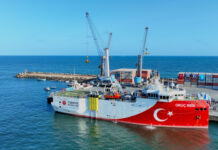Europe’s white nationalists are taking border control into their own hands.
Funded with money from American white supremacists and the “alt-right” movement, a group called Generation Identity has chartered a ship it plans to use to snatch Muslim migrants out of Mediterranean waters and deliver them back to the Middle East.
The group says it will be looking for migrants in distress, leaning on maritime law that requires any boater to come to the aid of another in order to collect and redirect non-white refugees. The group also plans to monitor the activity of non-governmental organizations, whose rescue operations in the Mediterranean are characterized by Generation Identity as human smuggling.
Generation Identity calls its effort “Defend Europe.”
“Defend Europe is the only way to secure the European borders and to stop the drowning in the sea,” said Martin Sellner, an Austrian member of Generation Identity who is leading Defend Europe, in a promotional video about the project.
Generation Identity — begun in France and now in Austria, Germany, Italy and the Netherlands — raised funds for the ship on an American alt-right crowd-sourcing platform, winning the attention of some of America’s most famous white supremacists.
David Duke, infamous anti-semite and former Ku Klux Klan leader, tweeted out a link to Defend Europe’s fundraising page. The Daily Stormer, a neo-Nazi and white supremacist American information site, has published several articles supporting the idea and calling for it to be replicated “on a massive scale.”
Defend Europe sought $80,000 for its ship. It raised over $158,000.
It’s this transatlantic collaboration that has hate group trackers worried.
“Everybody’s on the same page that essentially a white genocide is ongoing and that all white people across the Western world need to protect their interests and fight against this,” said Heidi Beirich, who tracks white supremacy and extremist groups at the Southern Poverty Law Center.
Amarnath Amarasingam, a senior research fellow at the Institute for Strategic Dialogue, said these group’s efforts haven’t gotten much attention because they were seen as one-offs.
“But if we are seeing a broader convergence into an international movement of some kind and they start to share resources and gain more support, and then there could be a real problem,” Amarasingam said.
Generation Identity launched the Defend Europe project in May after a group of its members physically blocked a humanitarian ship that was patrolling the Mediterranean in search of migrants in distress. The white nationalist group accused the rescue groups of waging a “silent genocide against Europeans” by bringing the drowning migrants to European shores.
More than 5,000 people drowned in the Mediterranean last year, with an estimated 2,257 perishing so far this year as of the end of June.
Using their own ship, the C-Star, Defend Europe intends to target NGO rescue operations in one of the most trafficked migrant routes in the world. The C-Star will abide by international law, the group says, and will come to the aid of any ship in its vicinity that sends out a distress signal.
But where NGOs would rescue the migrants and transport them to Europe, Defend Europe plans to transfer them to the Libyan Coast Guard for return to that country, which is essentially lawless. Defend Europe plans to destroy the vessels so they can not be used again to try and ferry people to Europe.
Defend Europe’s organizers have a prolific social media presence, which they use to push out fundraising appeals and updates on the C-Star’s whereabouts as the vessel winds its way from Djibouti through the Suez Canal and into the Mediterranean Sea.
So far, the mission hasn’t been seamless: The C-Star crew was detained this week in Cyprus on its way to Catania, Sicily to pick up the rest of the team planning to carry out the mission. They have been released and Defend Europe has stated on Twitter that it plans to go forward.
Generation Identity, whose members call themselves Identitarians, is Europe’s alt-right equivalent. The group opposes non-white immigration, particularly of Muslims. The size of its membership is unknown because there has been little academic research into the movement, unlike the study of white nationalist and supremacist groups in America.
Generation Identity adopted an ideology that grew out of the New Right movement in France in the 1970s.
“Their argument was that the French, for example, are not better than the Moroccans or the Turks, but they’re different and they should remain different,” said Cas Mudde, who tracks the radical right as an associate professor at the University of Georgia. “They’re classic nationalist, nativist, but there’s always an intellectual aspect to it, which is uncommon to the radical right.”
He said the Identitarians took up the mantle after the New Right movement petered out in the 1990s. But they made one important change: a focus on grabbing media attention. Mudde said the Identitarians, who are mostly young and educated, have had particular success by employing tactics long used on the radical left, like rolling out giant banners on the side of a building.
“It requires only six to 10 people but if you chose the right spot, you will get a lot of media attention,” Mudde said.
Indeed, the Defend Europe model has also been taken out of the leftist playbook: Greenpeace has used boats to disrupt whaling operations as far back as the 1970s.
Source by Amp.mcclatchydc











